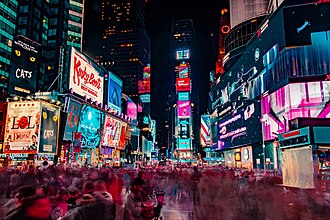
Back مناهضة النزعة الاستهلاكية Arabic Антиконсуматорство Bulgarian Anticonsumisme Catalan Konsumverweigerung German Anticonsumismo Spanish ضدمصرفگرایی Persian Anticonsommation French Anticonsumismo Galician אנטי-צרכנות HE Anti-konsumerisme ID

| Part of a series on |
| Anti-consumerism |
|---|
Anti-consumerism is a sociopolitical ideology that is opposed to consumerism, the continual buying and consuming of material possessions. Anti-consumerism is concerned with the private actions of business corporations in pursuit of financial and economic goals at the expense of the public welfare, especially in matters of environmental protection, social stratification, and ethics in the governing of a society. In politics, anti-consumerism overlaps with environmental activism, anti-globalization, and animal-rights activism; moreover, a conceptual variation of anti-consumerism is post-consumerism, living in a material way that transcends consumerism.[1]
Anti-consumerism arose in response to the problems caused by the long-term mistreatment of human consumers and of the animals consumed, and from the incorporation of consumer education to school curricula; examples of anti-consumerism are the book No Logo (2000) by Naomi Klein, and documentary films such as The Corporation (2003), by Mark Achbar and Jennifer Abbott, and Surplus: Terrorized into Being Consumers (2003), by Erik Gandini; each made anti-corporate activism popular as an ideologically accessible form of civil and political action. Predictors of anti-consumption attitudes and behaviours include individual and collective motivations resulting from negative experiences with a particular product or brand or may relate to a symbolic incongruence between one's sense of identity and a company's image (Iyer and Muncy, 2009, Kozinets et al., 2010, Lee and Ahn, 2016)
The criticism of economic materialism as a dehumanizing behaviour that is destructive to Earth, as human habitat, comes from religion and social activism. The religious criticism asserts that materialist consumerism interferes with the connection between the individual and God, and so is an inherently immoral style of life; thus the German historian Oswald Spengler (1880–1936) said that, "Life in America is exclusively economic in structure, and lacks depth."[2] From the Roman Catholic perspective, Thomas Aquinas said that, "Greed is a sin against God, just as all mortal sins, in as much as man condemns things eternal for the sake of temporal things";[3] in that vein, Francis of Assisi, Ammon Hennacy, and Mohandas Gandhi said that spiritual inspiration guided them towards simple living.
From the secular perspective, social activism indicates that from consumerist materialism derive crime (which originates from the poverty of economic inequality), industrial pollution and the consequent environmental degradation, and war as a business.
About the societal discontent born of malaise and hedonism, Pope Benedict XVI said in 2008 that the philosophy of materialism offers no purpose for human existence,[4] and in 2011 specifically attacked the commercialization of Christmas;[5] likewise, the writer Georges Duhamel said that "American materialism [is] a beacon of mediocrity that threatened to eclipse French civilization".[2]
- ^ "Postconsumers". Postconsumers. 2018-06-13. Retrieved 2018-10-18.
- ^ a b Stearns, Peter (2001). Consumerism in World History. Routledge. ISBN 9780415244091.
- ^ Aquinas, Saint Thomas (1981). Summa Theologica: Complete English in Five Volumes. Vol. 3. Ave Maria Press. p. 1680. ISBN 9780870610639.
- ^ "Our world has grown weary of greed: Pope". Independent Online. 17 July 2008. Retrieved 2 January 2022.
- ^ "Pope Benedict XVI attacks Christmas consumerism at Mass". BBC News. 25 December 2011.
© MMXXIII Rich X Search. We shall prevail. All rights reserved. Rich X Search